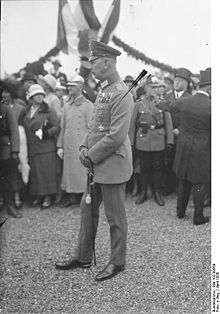- Oskar von Hindenburg
-
Generalleutnant Oskar von Beneckendorff und von Hindenburg (31 January 1883 – 12 February 1960) was the politically powerful son and aide-de-camp to Field Marshal and President of Germany Paul von Hindenburg.
Born in Königsberg, East Prussia, (now Kaliningrad, Russia), Hindenburg followed his father into the German Army. Initially, his career did not prosper, as Hindenburg's superiors considered him to be of low intelligence[citation needed]. One of the units Hindenburg served in was the Third Guards Regiment, where he was befriended by Kurt von Schleicher. After his father became a German war hero in World War I, Oskar von Hindenburg's career started to advance, thanks to his surname. During the war, Hindenburg (who achieved the rank of Major) acted as his father's liaison officer. After his father became President of the Weimar Republic in 1925, Major von Hindenburg acted as his father's aide-de-camp. As his father's closest friend and advisor, Oskar von Hindenburg exercised considerable power behind the scenes as he largely controlled access to the President. It was in large part due to his friendship with the younger von Hindenburg, that von Schleicher became Chancellor and one of the elder von Hindenburg's closest advisors. Because of this influence on the President beyond any control by constitutional means, the publicist and writer Kurt Tucholsky ironically spoke of him as "... the son of the president, not designated by the Reich's constitution ..."[1].
In January 1933, Major von Hindenburg, who had long been opposed to his father making Adolf Hitler Chancellor, was persuaded by Franz von Papen of his plan to have Hitler appointed Chancellor but having von Papen control Hitler from behind the scenes as Vice-Chancellor. It was in part because of this pressure from Major von Hindenburg, that his father appointed Hitler as Chancellor.
Shortly after his father's death in August 1934, Major von Hindenburg made a radio broadcast (18 August 1934) in which he asked the German people to vote "Yes" in a plebiscite that took place on 19 August. The question posed in this plebiscite, was whether the German people approved of Hitler merging the offices of President and Chancellor into one. The "Yes" vote amounted to over 90%.
Prewar years
William Shirer, in his book The Rise and Fall of the Third Reich, states that Oskar von Hindenburg was promoted to Major General after the plebiscite unifying the offices of President and Reich Chancellor and that he remained a loyal Nazi. While he did fade from the history of the Third Reich after this plebiscite, Shirer argues that this final act in Hitler's consolidation of power was vital and without Oskar von Hindenburg's earlier influence with his father, Paul von Hindenburg, on behalf of Hitler's bid to be invited to form a government after the fall of Chancellor von Schleicher on 28 January 1933, Hitler might not have ascended to power at all. Franz von Papen, who had served previously as Reich Chancellor until he was supplanted by Schleicher in December 1932 was negotiating behind Hitler's back to again be named Chancellor of a Presidential government (a government that would rule by decree under Article 48 of the Weimar Constitution) and almost succeeded, had it not been in large part for the influence of Oskar von Hindenburg on his father. While other factors are important, without the behind the scenes influence of Oskar von Hindenburg and State Secretary Meissner, Hitler would have had a much tougher time convincing Paul von Hindenburg to invite "that Austrian corporal" and the Nazis to form a government at all.
The other obvious influence in Hitler's favor was the likelihood of a coalition government with the Nationalist party. This almost fell apart at the last minute as well—the coalition partners were so intent arguing over prospective Cabinet appointments (the Nazis were ultimately outnumbered in the Cabinet 8-3) that they left Reichspresident Hindenburg waiting well past the appointed time for the meeting at which Hitler was named Chancellor. Hindenburg almost cancelled the meeting in exasperation. Hitler being named Chancellor was not certain until it was announced and it was Oskar von Hindenburg and his work with his father that (in Shirer's view) tipped the balance in Hitler's favor.
Shirer also claims that Hindenburg Junior received 5000 additional acres to his estates at Neudeck in addition to rapid advancement in the German Armed Forces.
World War II
Late in the war as Soviet forces approached Germany's border the younger Hindenburg supervised the dismantling of the War Monument honoring his father's victory over the Russians at Tannenberg in 1914. He also had his parents' remains moved west.
Oskar von Hindenburg died in Bad Harzburg, West Germany on 12 February 1960.
References
- ^ ... den in der Reichsverfassung nicht vorgesehenen Sohn des Reichspräsidenten ...
- Snyder, Louis Leo The Encyclopedia of the Third Reich, New York: McGraw-Hill, 1976.
- Henry Ashby Turner Hitler's Thirty Days to Power: January 1933, Reading, Mass.: Addison-Wesley, 1996
- Hiss, O.C. Hindenburg: Eine Kleine Streitschrift, Potsdam: Sans Souci Press, 1931.
- William Shirer, The Rise and Fall of the Third Reich
Categories:- 1883 births
- Knights of the Order of Saint John (Bailiwick of Brandenburg)
- 1960 deaths
- People from Kaliningrad
- People from East Prussia
- People from Königsberg
- People of the Weimar Republic
- German politicians
- German military personnel of World War I
Wikimedia Foundation. 2010.

